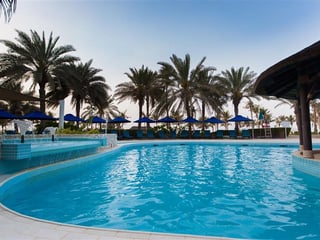A true taste of Dubai
Although modern flavours and innovative techniques strongly influence the Emirati food of today, the cuisine still proudly holds onto its traditional character. Many dishes are comprised of rice and either fish or meat (mutton, lamb, goat or chicken, usually) both of which are flavoured with a medley of aromatic spices, including saffron, cloves, cinnamon, cumin, turmeric and nutmeg. Dried fruits, nuts and a good sprinkling of fresh herbs add a burst of colour and finish off most dishes, making them appealing to the eye as well as the taste buds.
In spite of the sophisticated glamour that Dubai is well known for, the local Dubai cuisine is a lot more humble and is best described as hearty soul food. Designed to satisfy and comfort, Emirati cuisine is quite tricky to get a hold of in UAE restaurants, simply because the ever-expanding expat community means that there is only a tiny percentage of Emirati chefs in the city. Moreover, many Emirati men believe cooking to be emasculating, so it’s not a job that men line up to do. So if you do ever get the chance to try authentic Emirati food, consider it to be a rare treat and lap it up!
Influences
Much like Dubai itself, the city’s food has been heavily influenced by a melting pot of cultures from across the globe to create a fascinatingly cosmopolitan cuisine which you could never tire of. For this reason, it’s easy to confuse Emirati food with that of any other Middle Eastern or Asian cuisine, but to do so would be to focus on only one small crumb on a buffet table of delights.
In Dubai, most meals start with a mezze platter of flatbreads, hummus, tabbouleh and other exotic dips, directly adapted from Levantine cuisine. Many main dishes are cooked as stews either in large saucepots or in tagines – a method taken straight from Moroccan cooking. A lot of the spices and even some of the cooking methods have been heavily influenced by India, but a few tweaks and substitutions here and there mean that the two cuisines are distinctly different – even if the ingredients list and instructions are remarkably similar.
Rarely are recipes of ingredients lifted directly from another culture – the Emiratis always like to add their own twists. A cup of camel milk, a sprinkling of saffron threads, the use of dried limes or a dash of rosewater is sometimes all that’s needed to make a dish quintessentially Emirati.
Friday brunch
If you were ever faced with choosing your last meal, an Emirati Friday brunch would definitely be a good pick. Why? Because these brunches can span a huge number of courses from far-flung exotic nations across the world and can take literally hours to eat. We’ve all been to buffet restaurants before, but even the best buffet restaurant you can remember won’t come close to the likes of a Friday brunch in Dubai.
Whilst most people combine breakfast and lunch into brunch, Emiratis take it to a whole new level and merge every dish you’ve ever eaten into one single sitting for the favourite meal of the week. Friday is the first day of the weekend in the UAE and it’s the official rest day, which means most locals have more than enough time to indulge in good food and great company. Despite Dubai’s foodie culture still emerging, the Friday brunch has already become established and come Friday afternoon, expats and Emiratis alike head to their favourite restaurants for a buffet unlike any other. As you’d expect for an experience as lavish as this, it may come with a fairly hefty price tag (though it certainly offers superb value for money), but it’s something you’ve absolutely got to do at least once whilst you’re in Dubai.
Since hotels are the only places in Dubai able to obtain alcohol licences, they’re the best places to be when it comes to Friday brunch. During this special part of the day, the drinks are flowing just as much as the food is, with top-notch international wines, French imported champagnes, perfectly paired ports and stunning cocktails all gracing the tables. Although it’s still a criminal offence to drink alcohol or even be drunk in public, these rules don’t seem to apply in hotels on Friday afternoons, so feel free to relax. Combine free-flowing alcohol with the best food you’ve ever tasted and superb entertainment in the form of bands, solo artists and DJs and you’ve got an amazing afternoon not to be missed!
But it’s not just adults that are taken care of. You’ll find many families out together enjoying Friday brunch, which is why many hotels offer dedicated kids’ zones with games, face-painting, shows, balloon artists, video games and sometimes even petting zoos which the littles ones can enjoy whilst you treat yourself to true fine dining.
Being the multi-cultural cosmopolitan city that it is, most Friday brunches are made up of captivating cuisines from all over the world, with high-quality imported ingredients lovingly crafted together by qualified chefs of that nationality to conserve genuine authenticity. The first few courses are usually made up of luxury starters, including freshly-shucked oysters, mussels, sushi, snails, lobster, ceviche, tuna tartare, smoked duck and innovative pates – and that’s just to get you going!
Main courses comprise of everything from thick and juicy steaks, delicate racks of lamb and typical Emirati Shawarma to traditional British pub grub pie and mash, Chinese rice-based dishes and Arabic salads. Although it might be tempting to go to town on all the incredible meat and fish dishes on offer, it’s paramount that you leave room for dessert. If you do, decadent treats like rich chocolate cakes, smooth crème brulee, bite-sized macaroons, gorgeous cupcakes, velvety cheesecakes, luxurious chocolate fountains and hearty cheeseboards will be waiting for you.
Whichever type of dining atmosphere you prefer, you’re well catered for in Dubai. You’ll find everything from five-star hotels with fine dining in sophisticated surroundings and family-friendly affairs with food closer to home to barbecue brunch buffets with themed décor and smaller hotels with more economic brunch options available all across the city.
Remember that there is a zero tolerance policy to drink driving in Dubai, so if you’re planning on being behind the wheel at all after brunch, you’ll need to drink nothing more fun than fruit juice. If you are planning to have a drink, you’ll need to pre-book transport to get you back to your hotel or be prepared to wait shoulder-to-shoulder with the other guests in the taxi queue which is guaranteed to be lengthy. With this in mind, your best bet is to have brunch in the hotel you’re staying in – this way you’ll only be one lift ride away from your bed where you can sleep off multiple courses of gourmet indulgence.
Traditional Emirati dishes
Stuffed camel
You read that right – stuffed camel! This luxury dish is reserved only for the most important occasions, such as weddings and Eid, in the most elite households but it’s exactly as it sounds. A whole camel is stuffed with layers upon layers of chicken, fish, mutton, eggs and spices then spit-roasted whole oven an open fire for hours until cooked through. This unique dish is so incredible that it’s even listed in the Guinness World Book of Records as the world’s largest item on a menu!
Al harees
Al harees is a fairly simple and humble dish, made from just four basic ingredients – meat, water, salt and wheat. Most commonly served in Emirati homes during Ramadan, this staple is made by boiling all the ingredients together for hours until soft, then whisking until they develop a creamy porridge-like consistency. The cooking pot is then surrounded with charcoal, placed in a specially-prepared hole in the ground (or inside a purpose-built clay oven) and left to cook overnight. The final product is served by scooping it into individual serving dishes and topping it with nothing more than ghee (clarified butter). Despite the plain-sounding ingredients and lack of exotic spices, Al harees has a distinctive flavour which most find strangely addictive.
Al machboos
Al machboos, sometimes called matchbous, is another one-pot wonder, albeit slightly more interesting. This dish is made by cooking meat (usually lamb, mutton or chicken) along with a handful of spices, tomatoes, onions and dried limes (known as loomi) in a large saucepan of boiling water or stock until the meat is fall-off-the-bone tender. The meat is then removed and rice is stirred into the pot. When the rice is cooked, the meat is added back into the saucepan and everything is cooked together for a final couple of hours to ensure a delicate texture and intense flavour.
Shawarma
Although shawarma is originally Levantine, it’s been eagerly adapted by hungry Emiratis as their go-to street food, thanks to its low cost, easy portability and addictive flavour. In fact, shawarma is so popular that it’s spread far out beyond Dubai and can easily be found anywhere from Delhi and Tokyo to New York City and Moscow. This local favourite is made from spiced slow-roasted meat (usually lamb, mutton or chicken) which is cut into thin slices and nestled inside an Arabic roti alongside tomatoes, pickles and a delicious garlic sauce. However, there is no definitive shawarma recipe and every chef and cook seems to have their own set of add-ins – although the garlic sauce is usually always present.
Ghuzi
Also called khuzi, this delicious dish is comprised of whole-roasted lamb or mutton served on top of a bed of fluffy rice sprinkled with vegetables and nuts. Locals love this staple and you’ll find it on the menu of restaurants of all calibre, because it’s a complete meal all on its own.
Al machboos recipe
Most of the ingredients in this recipe for al machboos you’ll find readily available in your local supermarket. But for the dried limes (loomi), you’ll need to look for your nearest Middle Eastern supermarket or search online. The traditional cooking technique for this Emirati dish lasts for hours, but the cooking times here have been reduced, so that you’ll be able to get this incredible dish on the table in under 2 hours without forfeiting any delicious flavours or textures.
This recipe takes 25 minutes to prep, 1 hour 20 minutes to cook and serves four as a main meal.
Ingredients
3 tablespoons butter, divided
4 chicken thighs
1 large onion, finely sliced
1 garlic clove, minced
1 1⁄2 teaspoons ground turmeric
1 1⁄2 teaspoons curry powder
1 1⁄2 teaspoons ground cumin
1 teaspoon ground cinnamon
1⁄2 teaspoon chilli powder
Pinch saffron
2 whole dried limes (loomi)
2 large tomatoes, diced
6 whole cloves
4 cups chicken stock
2 cups uncooked basmati rice, rinsed and drained
1 teaspoon salt
1. Place 2 tablespoons of butter in a large frying pan over a high heat and seal the chicken for approximately 60 seconds on each side until browned all over. Remove the chicken and set to one side
2. Stir another tablespoon of butter into the frying pan and add in the onion and garlic. Reduce the heat to medium and cook for 10 minutes, until the vegetables are soft and they’re beginning to brown
3. Stir in the ground turmeric, curry powder, ground cumin, ground cinnamon, chilli powder and saffron and place the chicken pieces on top
4. Stab each of the limes a few times with a knife (to allow the juices to emerge) and add them to the frying pan whole with the tomatoes, whole cloves and chicken stock
5. Bring the dish to a boil over a high heat then reduce the heat to low, place a lid on the frying pan and leave to simmer for one hour
6. Remove the dried limes, whole cloves and stir in the rice and salt. Place the lid back on the frying pan and leave to simmer for another 20 minutes, until the rice is fully cooked
7. To serve, scoop the rice and vegetables onto a plate and top with one chicken thigh
More Inspiration
Recommended holidays
















